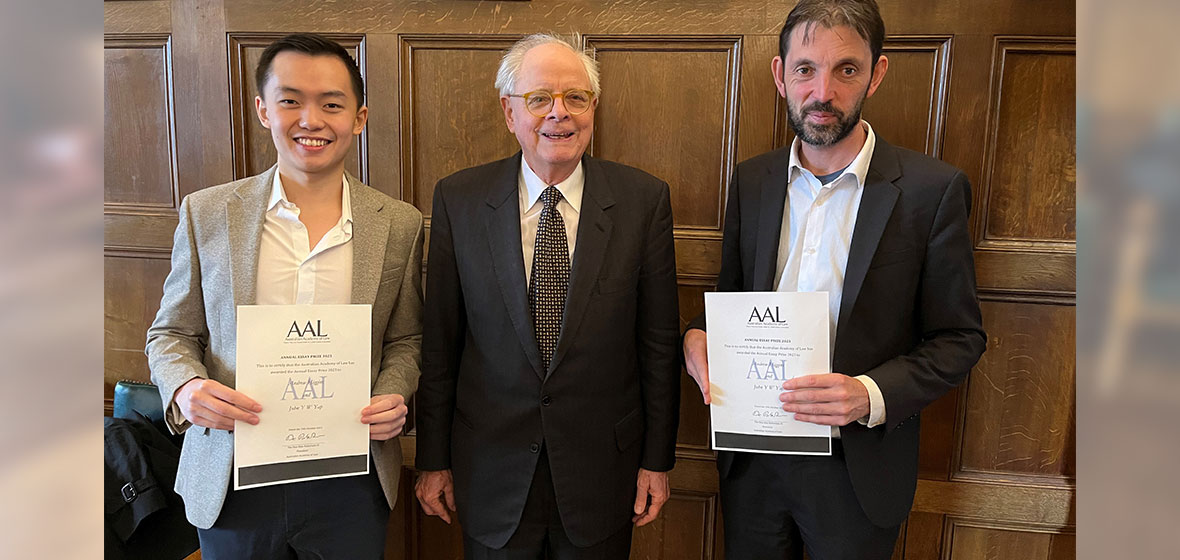An Oxford University Law Professor and his former student have jointly won the 2023 Australian Academy of Law’s (AAL) Annual Essay Prize – by arguing against the question.
This year’s competition addressed the issue of the increase in mass torts and class actions in Australia and asked entrants to consider whether the growth of such private litigation in Australia and elsewhere could ‘be described as an evolutionary form of “privatised regulation”, gap-filling where the state and its regulators have not fully or properly controlled or deterred behaviours, or protected and compensated affected person. To what extent is it successful in that regard? Should it be encouraged? Why or why not? Give examples.’
Professor Andrew Higgins and his former student John Yap co-authored the winning eight-thousand word essay, which presented both a critical response to the question and a fresh perspective on the issues.
In their essay, the pair accepted that class actions as ‘privatised regulation’ has gained traction in Australia and elsewhere but argued that ‘the description is inaccurate and distorts the true relationship between regulation, tort law and procedural law.
‘Tort law cannot be described as a form of regulation because the two are different modalities of law and the class action procedure does not change this.’ Higgins and Yap wrote.
The judging panel included former High Court Justice, William Gummow AC KC, Federal Court Judge Catherine Button and ANU Emeritus Professor Peta Spender who said the winning entry was sophisticated, original, and provocative and is sure to generate further debate about this controversial area.

Professor Higgins is a practising barrister in Victoria and Oxford University Professor of Civil Justice Systems at the Law Faculty and a Fellow in Law at Mansfield College. He teaches and convenes the BCL/MJur Principles of Civil Procedure course and FHS Civil Dispute Resolution course.
John Yap has just completed his Oxford Bachelor of Civil Law and currently teaches contract law at Mansfield College, while going through the arduous process of qualifying as a barrister in London.
Higgins says he did not hesistate in joining forces with his former student and described Yap as an extraordinarily bright student with useful insights into whatever area of law he turns his mind to.
“My main areas of academic research and teaching are civil justice systems and tort law. Also, as a practising barrister, I specialise in mass tort litigation so the question for this year’s competition felt like my lucky numbers had come up. Because I’ve spent a lot of time thinking and writing about what class actions are designed and not designed to do, I felt almost professionally obliged to submit an entry.” Higgins said.
Yap says he developed a keen interest in private law remedies and the principles of civil procedure during his studies and when he saw the AAL essay question, it was the perfect opportunity to explore his ideas in depth with his former teacher.
“Andrew taught me in these areas, and I hoped that my thoughts on the current academic debates would complement his expertise and experience in class actions and mass torts litigation. I am honoured that he agreed to co-author the essay with me.” Yap said.
The winning authors are delighted to have won the competition and for Yap, the shared $10,000 award is particularly helpful.
“As a current bar course student in London, the generous prize from the AAL is welcome support along what can sometimes feel like a never-ending journey to qualifying as a barrister.” Yap said.
Launched in 2015, the AUD$10,000 prize is open to anyone, anywhere who is studying or has studied legal subjects at a tertiary level, or who is working or has worked in a law-based occupation.
The winning essay is on the AAL website and will be published in an upcoming edition of the Australian Law Journal.




